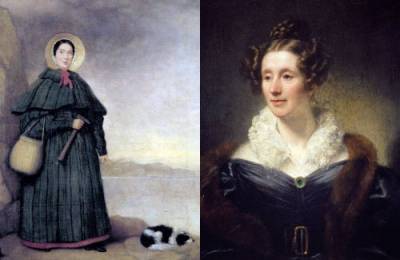UCL Department of Science and Technology Studies (STS) offers CPD events for sixth-form teachers to expand their knowledge about our subjects while sharing best practice for the classroom.
"Mary Mary Revolutionary" was a continuous professional development (CPD) event for UK sixth form teachers seeking ways to expand student horizons while also thinking about wider options for degrees at university-level. This was a free event organised by UCL Department of Science and Technology Studies (STS).

Mary Mary Revolutionary
Lockdown2 in England got us thinking about twos and the connections among pairs of things. This event brings together two colleagues in UCL Department of Science and Technology Studies (STS) to talk about two of the extraordinary women we study:
- Mary Somerville (1780-1872) was a mathematician and astronomer best known for her research in physics and her championing of interdisciplinarity
- Mary Anning (1799-1847) was a palaeontologist and businesswoman best known for fossil discoveries of ichthyosaurs and plesiosaurs
What joins these two experts together in history and philosophy? What can their stories tell us about the subjects close to our your hearts? What are the unexpected twists that make their stories even more fascinating? And the most important question of all: How can you use their stories to further your curriculum? Yes, "women in science" is one answer. But we have more. Much more.
In this CPD workshop we’ll talked about these scientists and how their stories can be useful for the programmes teachers want to deliver in sixth form programmes.
““Whatever difficulty we might experience in the middle of the nineteenth century in choosing a king of science, there could be no question whatever as to the queen of science.” (The Morning Post from London, 2 Dec 1872 about Mary Somerville on the announcement of her death)
Attendees received a “certificate of participation” from UCL Department of Science and Technology Studies (STS), likely to raise levels of envy across your school.
Who are the STS academics?
Dr Chiara Ambrosio is Associate Professor of History and Philosophy of Science. She is an expert on the philosophy of Charles Sanders Peirce and our specialist on relationships between science, art, and philosophy.
Professor Joe Cain is Professor of History and Philosophy of Biology. He is an expert on the history of evolutionary theory and our expert on palaeontology and public displays such as the Crystal Palace Dinosaurs.
Both are academics in UCL Department of Science and Technology Studies (STS). Each receives consistently outstanding teaching evaluations from students. They both are keen to move their subjects beyond traditional canons and storylines. Join us. There's so much to learn.
Additional information about STS
More about CPD with STS: ucl.ac.uk/sts/cpd
More about STS undergraduate degrees: ucl.ac.uk/sts/bsc
Resources on Mary Somerville
Mary Somerville, On the Connexion of the Physical Sciences. London: John Murray 1858 (ninth edition).
Available on the Internet Archive here: https://archive.org/details/connexionofphysi00somerich
Anonymous [William Whewell], "'On the Connexion of the Physical Sciences', by Mrs Somerville", The Quarterly Review, vol 51, 1834, pp. 54-68.
Available via Hathi Trust here: https://babel.hathitrust.org/cgi/pt?id=uc1.$b661406&view=1up&seq=64
This is the article in which the word 'scientist' first appears in print
Jim Secord, "Mary Somerville's Vision of Science", Physics Today, vol 71 no. 1, pp. 46-52. Available Open Access here: https://physicstoday.scitation.org/doi/pdf/10.1063/PT.3.3817
A very accessible overview of Somerville's life and work, and her place in history and philosophy of science.
Melinda Baldwin, "The History of 'Scientist'", a blog post that traces the complicated history of a word we now take for granted. Available on the blog The Renaissance Mathematicus (a fantastic resource!) here: https://thonyc.wordpress.com/2014/07/10/the-history-of-scientist/
Resources on Mary Anning
Mary Anning's biography is covered, in basic outlines, in many locations. The best biographical research has been undertaken by Hugh Torrens, a brilliant historian of paleontology. The best one-stop source for Anning ishis paper:
Torrens, Hugh. 1995. Presidential Address: Mary Anning (1799-1847) of Lyme; 'The Greatest Fossilist the World Ever Knew’, British Journal for the History of Science 28(3): 257-284. http://www.jstor.org/stable/4027645.
The connection drawn
Charles Dickens (editor), "Mary Anning, the Fossil Finder", All the Year Round, vol 13 (303), 1865, pp. 60-63. Available via Hathi Trust here: https://babel.hathitrust.org/cgi/pt?id=mdp.39015074642474&view=image&seq=74
Brings together connections between Anning and Somerville we discussed in our session. Michael Taylor and Hugh Torrens has discovered this is a twice plagiarised piece, quite a common practice in British publishing of the period. This is described in their article:
Taylor, Michael and Hugh Torrens. An account of Mary Anning (1779-1847), fossil collector of Lyme Regis, Dorset, England, published by Henry Rowland Brown (1837-1921) in the second edition (1859) of Beauties of Lyme Regis, Proceedings of the Dorset Archaeological and Natural History Society, 135, 62-70, 2014.
The same material was published in Chambers Journal a few years previously:
Taylor, Michael and Hugh Torrens. 2014. An anonymous account of Mary Anning (1799-1847), fossil collector of Lyme Regis, England, published in Chambers's Journal in 1857, and its attribution to Frank Buckland (1826-1880), George Roberts (c. 1804-1860), and William Buckland (1784-1856), Archives of Natural History 41(2): 309-325, 2014. Online.
 Close
Close

